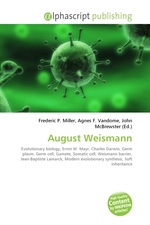August Weismann
Frederic P. Miller, Agnes F. Vandome, John McBrewster
бумажная книга
Friedrich Leopold August Weismann (Frankfurt am Main, 17 January 1834 – Freiburg, 5 November 1914) was a German evolutionary biologist. Ernst Mayr ranked him the second most notable evolutionary theorist of the 19th century, after Charles Darwin. Weismann advocated the germ plasm theory, according to which (in a multicellular organism) inheritance only takes place by means of the germ cells—the gametes such as egg cells and sperm cells. Other cells of the body—somatic cells—do not function as agents of heredity. The effect is one-way: germ cells produce somatic cells, and more germ cells; the germ cells are not affected by anything the somatic cells learn or any ability the body acquires during its life. Genetic information cannot pass from soma to germ plasm and on to the next generation. This is referred to as the Weismann barrier. This idea, if true, rules out the inheritance of acquired characteristics as proposed by Jean-Baptiste Lamarck. The idea of the Weismann barrier is central to the Modern evolutionary synthesis, though it is not expressed today in the same terms.
Данное издание не является оригинальным. Книга печатается по технологии принт-он-деманд после получения заказа.


